Paradise Alley Blu-ray Movie
HomeParadise Alley Blu-ray Movie 
Shout Factory | 1978 | 109 min | Rated PG | Apr 23, 2019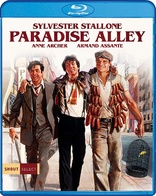
Movie rating
6.1 | / 10 |
Blu-ray rating
| Users | 4.0 | |
| Reviewer | 2.5 | |
| Overall | 2.5 |
Overview
Paradise Alley (1978)
Three Italian-American brothers, living in the slums of 1940's New York City, try to help each other with one's wrestling career using one brother's promotional skills and another brother's con-artist tactics to thwart a sleazy manager.
Starring: Sylvester Stallone, Lee Canalito, Armand Assante, Frank McRae, Anne ArcherDirector: Sylvester Stallone
| Drama | Uncertain |
| Comedy | Uncertain |
Specifications
Video
Video codec: MPEG-4 AVC
Video resolution: 1080p
Aspect ratio: 1.85:1
Original aspect ratio: 1.85:1
Audio
English: DTS-HD Master Audio 2.0 (48kHz, 24-bit)
Subtitles
English SDH
Discs
Blu-ray Disc
Single disc (1 BD)
Playback
Region A (B, C untested)
Review
Rating summary
| Movie | 3.0 | |
| Video | 2.5 | |
| Audio | 3.0 | |
| Extras | 2.0 | |
| Overall | 2.5 |
Paradise Alley Blu-ray Movie Review
Reviewed by Brian Orndorf April 29, 20191978 was a critical year in the career of Sylvester Stallone. In 1976, Stallone became a major Hollywood player with “Rocky,” which he scripted, finding himself a primary participant in the highest-grossing film of year, which would go on to collect a Best Picture Oscar in 1977. Previously dealing with poverty and powerlessness in the business, Stallone could suddenly call his own shots, allowed to take his future wherever he wanted it to go. Two years after “Rocky,” Stallone tried to tighten his dramatic chops in Norman Jewison’s “F.I.S.T.” -- a pairing that didn’t win over audiences. And then there was “Paradise Alley,” which gifted the star a chance to command his own vision, making his directorial debut with the effort. Stallone’s intent with the movie isn’t difficult to decode, setting out to replicate a melodrama from the 1950s, but the shadow of “Rocky” remains on the endeavor, which labors to find a comfortable middle ground between underdog cinema manipulation and a gritty, unsentimental study of broken people and shattered dreams in the harsh reality of life in the big city.
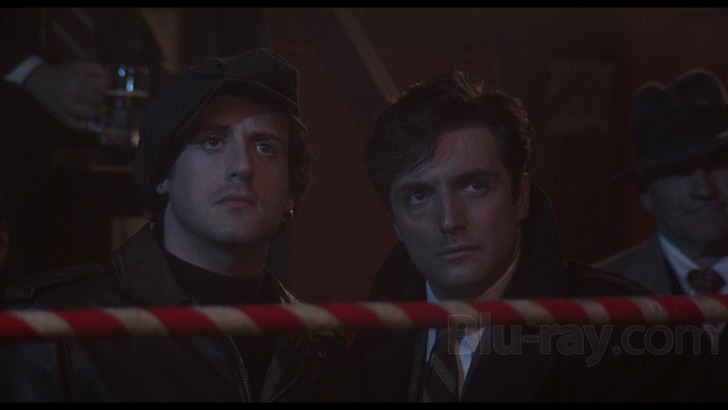
Cosmo Carboni (Sylvester Stallone) is a small-time con man trying to make a major score to radically change his dismal life in 1946. He lives in Hell’s Kitchen with his younger brother, Victor (Marlon Brando lookalike Lee Canalito), a sweet but dim man who uses his hulking frame to deliver ice around the community, showcasing his strength. Cosmo’s older sibling is Lenny (Armand Assante), a disabled World War II veteran who works as a mortician, keeping to himself while tending to the needs of dead bodies. Sensing something important about Victor’s size, Cosmo pushes his brother into the world of wrestling, with Paradise Alley the home for squared circle challenges, offering easy money for physical pain. While Lenny is unsure of the scheme, worried about Victor’s health, he soon joins Cosmo in a managerial role, with the pair testing the patience of local gangster, Stitch (Kevin Conway). While a wrestling career for Victor is shaped, Lenny reconnects with his old flame, Annie (Anne Archer), a taxi dancer who’s also romantically entangled with Cosmo, complicating family relations as sporting glory awaits their baby brother.
Stallone has big plans for “Paradise Alley,” talking on the difficulty of a period picture for his helming debut, returning audiences to 1946, with the New York community working to return to normalcy after the war. The mood of Hell’s Kitchen isn’t particularly bright, with Cosmo representative of the locals, working every single angle he can conjure with his big mouth, including a rooftop race than accompanies the main titles (the film’s theme song is unexpectedly performed by Stallone as well, securing either ambition or hubris for the production -- you make the call), watching Cosmo and his competition leap across large buildings for a small reward. The brazen young man’s actions drive the plot of “Paradise Alley,” as Cosmo is the first to persuade Victor to test his muscles with an arm-wrestling match against one of Stitch’s men, trying to win a small monkey to help score coins with street performing. Cosmo’s a man of limited vision, but his bravado and nervous energy makes sense, with Stallone trying very hard to communicate the character’s inner drive to make magic happen in his life, unable to consider a different way out of his current situation.
Stallone’s turn as Cosmo is often played for laughs, and the screenplay pays tribute to classic cinema with rat-tat-tat dialogue exchanges and cartoony depictions of threat, with Stitch the antagonist of the movie, but hardly menacing, emerging as a more of a “Dick Tracy”-style goon. Broadness is always present, but there’s an intriguing grimness to the picture, with this collection of troubled people trying to alter their dismal lives in one way or another. The feature doesn’t dig too deep into personal matters, but evidence is there to support that “Paradise Alley” was more interested in emotional stakes at one point during its development, watching Victor finding love with a Chinese laundress who provides a sense of peace in his life, and Annie has interest in art to feed her soul after being deadened as a taxi dancer, urged into prostitution by her boss. Lenny’s arc is also compelling, with the war vet struggling with a crippling injury, hoping to get back into Annie’s orbit after abandoning her. Melodrama soon floods the film, but certain scenes connect on an emotional level, with the most potent belonging to Big Glory (Frank McRae), a black wrestler who’s reached the end of his potential, left with nothing to show for his efforts, with depression finally setting in. It’s certainly not cheery stuff, but grit is far more compelling than lighter antics with the Carboni Brothers and their wrestling plan for Victor, a.k.a. Kid Salami.
Paradise Alley Blu-ray Movie, Video Quality 
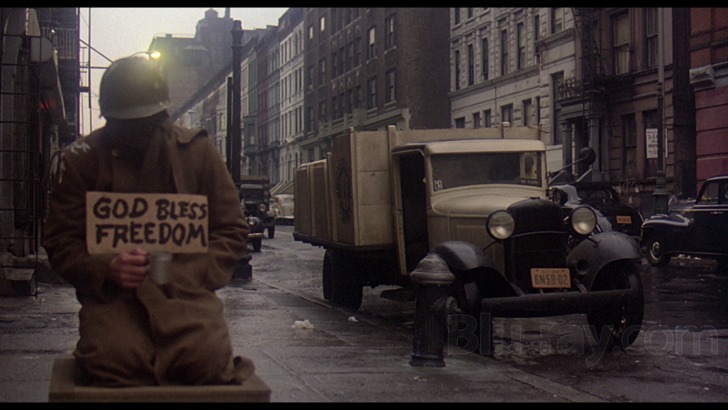
The AVC encoded image (1.85:1 aspect ratio) presentation doesn't offer a fresh scan of the 1978 movie, though "Paradise Alley" was never a sharply defined feature to begin with. Age is apparent, with softness common, even more so than the gauzy cinematography demands, and crush is present, losing frame information during evening interactions and with certain dark outfits. Detail isn't there, with a hazy examination of facial surfaces and period costuming, which often favors thin, soiled shirts and heavier gangster wear. Lively interiors, such as Paradise Alley and bars, provide a passable read of decoration and depth, while illuminated New York locations fare a little better. Filtering is present. Grain is chunky. Source isn't roughed up, with brief speckling and scratches.
Paradise Alley Blu-ray Movie, Audio Quality 
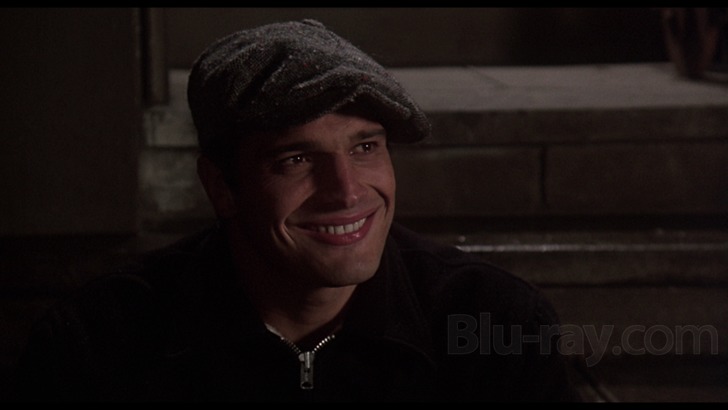
The 2.0 DTS-HD MA sound mix isn't sharply defined, offering a more age-appropriate frontal push of elements, contributing to a slightly chaotic listening experience with some shrill highs. Dialogue exchanges are acceptable, providing clarity with tough guy accents and excitable performances. Scoring isn't crisp, but instrumentation is noted, and the warmth of Bill Conti's work provides the feature with broad emotional movements. Soundtrack offerings from Tom Waits deliver a more delicate piano presence. Sound effects are loud, giving wrestling matches blunt slams and slaps, and NYC bustle is highlighted. Mild hiss is present.
Paradise Alley Blu-ray Movie, Special Features and Extras 
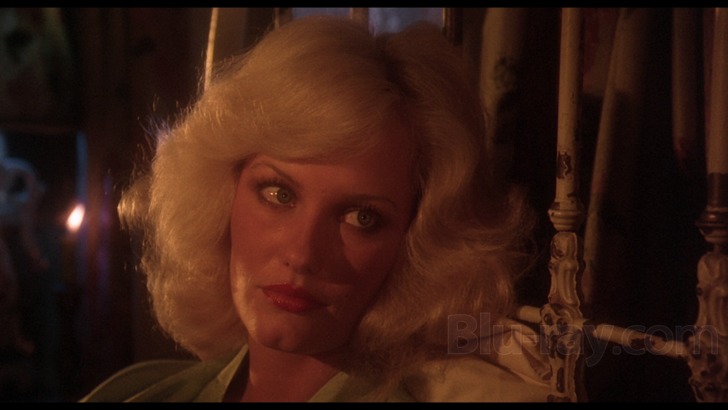
- Still Gallery (5:32) collects publicity stills, BTS snaps, poster art, and ad slicks.
- Radio Spots (1:05) provide two commercials for "Paradise Alley."
- And Theatrical Trailer #1 (1:30, SD) and Theatrical Trailer #2 (3:41, SD) are included.
Paradise Alley Blu-ray Movie, Overall Score and Recommendation 
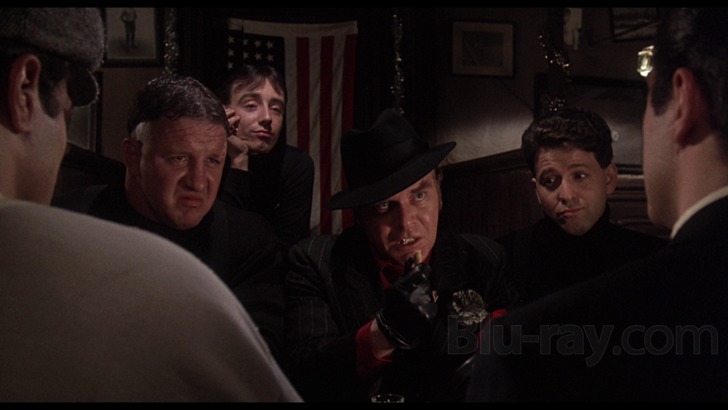
Wrestling doesn't begin to play a major role in "Paradise Alley" until the 70-minute mark, but once it does, the feature noticeably deflates, becoming more about sports film cliches than characterization, as Stallone recycles "Rocky" formula for Victor's climatic match against a bulky opponent, with the grapplers going at each other in a rain-soaked ring. Stallone tries to protect himself with the audience-pleasing finale, going with proven formula to make sure the endeavor exits on a certain level of adrenaline and joy. However, that's not how "Paradise Alley" opens, making this sudden turn to mainstream entertainment jarring and unwelcome. Granted, there's little expectation for Stallone to make an intense drama about hardscrabble lives during a transition period in American history, but it's hard to enjoy the candied aspects of the story when there's real soulful desperation here that's much more interesting to follow.
Similar titles
Similar titles you might also like

Crossing the Bridge
1992

Chokeslam
2016

The Wild Life
1984

Donnybrook
2018

Prevenge
2016

Blood Diner
Collector's Series
1987

The Wolf Man 4K
1941

Angel Town
Special Edition | MVD Rewind Collection #11
1990

Penitentiary II
1982

All Men Are Apes!
1965

Donny's Bar Mitzvah
2021

The Swinging Cheerleaders
1974

Roman
2006

Supercock
Fowl Play, Bet to Kill
1975

Fanny Hill
1964

The Tiger Hunter
2016

Chocolate Strawberry Vanilla
2013

My Tutor
1983

Saturday Night at the Baths
Slipcover in Original Pressing
1975

Monster Brawl
2011